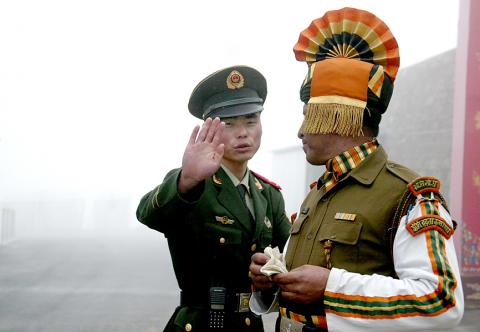China has stepped up its rhetoric in an increasingly tense border row with India, hinting at the possibility of military action in a propaganda push that analysts are calling “genuinely troubling.”
For more than a month, Indian and Chinese troops have been locked in a standoff on a remote, but strategically important Himalayan plateau near where Tibet, India and Bhutan meet.
On Thursday, Chinese Ministry of Defense spokesman Ren Guoqiang (任國強) said that Beijing had shown restraint, but had a “bottom line.”

Photo: AFP
“No country should underestimate the Chinese forces’ ... resolve and willpower to defend national sovereignty,” Ren said in a post on the ministry’s Web site.
It is a line that has been echoed almost word for word this week by the Chinese Ministry of Foreign Affairs, the Xinhua news agency, the Chinese Communist Party mouthpiece the People’s Daily, the official military news Web site of the Chinese armed forces and other outlets.
On Wednesday, the foreign ministry released a 15-page document of “facts” about the border dispute, which included a map of alleged intrusions and photographs of what it stated were Indian troops and military vehicles on China’s side of the border.
Calling for the “immediate and unconditional” withdrawal of Indian troops, it said that Beijing would “take all necessary measures” to safeguard its interests.
Chinese Ministry of Foreign Affairs spokesman Geng Shuang (耿爽) on Thursday said that India was building roads, hoarding supplies and deploying a large number of troops in the area.
“This is by no means for peace,” Geng said.
Mistrust between the two sides goes back centuries and they fought a brief war in 1962 in India’s Arunachal Pradesh.
The recent escalation of China’s rhetoric was “genuinely troubling,” said Rory Medcalf, head of Australian National University’s National Security College. “It suggests that diplomatic conversations, including among high-level national security advisers, are failing to find a face-saving way for the two powers to withdraw their forces.”
The plateau is strategically significant, as it gives China access to the so-called “chicken’s neck” — a thin strip of land connecting India’s northeastern states with the rest of the country.

NATIONAL SECURITY THREAT: An official said that Guan Guan’s comments had gone beyond the threshold of free speech, as she advocated for the destruction of the ROC China-born media influencer Guan Guan’s (關關) residency permit has been revoked for repeatedly posting pro-China content that threatens national security, the National Immigration Agency said yesterday. Guan Guan has said many controversial things in her videos posted to Douyin (抖音), including “the red flag will soon be painted all over Taiwan” and “Taiwan is an inseparable part of China,” while expressing hope for expedited “reunification.” The agency received multiple reports alleging that Guan Guan had advocated for armed reunification last year. After investigating, the agency last month issued a notice requiring her to appear and account for her actions. Guan Guan appeared as required,

A strong cold air mass is expected to arrive tonight, bringing a change in weather and a drop in temperature, the Central Weather Administration (CWA) said. The coldest time would be early on Thursday morning, with temperatures in some areas dipping as low as 8°C, it said. Daytime highs yesterday were 22°C to 24°C in northern and eastern Taiwan, and about 25°C to 28°C in the central and southern regions, it said. However, nighttime lows would dip to about 15°C to 16°C in central and northern Taiwan as well as the northeast, and 17°C to 19°C elsewhere, it said. Tropical Storm Nokaen, currently

‘NATO-PLUS’: ‘Our strategic partners in the Indo-Pacific are facing increasing aggression by the Chinese Communist Party,’ US Representative Rob Wittman said The US House of Representatives on Monday released its version of the Consolidated Appropriations Act, which includes US$1.15 billion to support security cooperation with Taiwan. The omnibus act, covering US$1.2 trillion of spending, allocates US$1 billion for the Taiwan Security Cooperation Initiative, as well as US$150 million for the replacement of defense articles and reimbursement of defense services provided to Taiwan. The fund allocations were based on the US National Defense Authorization Act for fiscal 2026 that was passed by the US Congress last month and authorized up to US$1 billion to the US Defense Security Cooperation Agency in support of the

PAPERS, PLEASE: The gang exploited the high value of the passports, selling them at inflated prices to Chinese buyers, who would treat them as ‘invisibility cloaks’ The Yilan District Court has handed four members of a syndicate prison terms ranging from one year and two months to two years and two months for their involvement in a scheme to purchase Taiwanese passports and resell them abroad at a massive markup. A Chinese human smuggling syndicate purchased Taiwanese passports through local criminal networks, exploiting the passports’ visa-free travel privileges to turn a profit of more than 20 times the original price, the court said. Such criminal organizations enable people to impersonate Taiwanese when entering and exiting Taiwan and other countries, undermining social order and the credibility of the nation’s